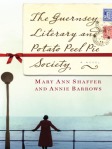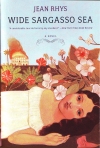In anticipation of summer vacations full of summer reading, the staff at Chatham Community Library offer up these great recommendations for your summer reading pleasure…
Amy: The Guernsey Literary and Potato Peel Pie Society by Mary Ann Shaffer.
 Visit the Channel Islands during World War II and honor creativity in adversity! It’s the power of books and community told through letters.
Visit the Channel Islands during World War II and honor creativity in adversity! It’s the power of books and community told through letters.
Brendan: Lost Rights by David Howard
I’m currently reading Lost Rights: The Misadventures of a  Stolen American Relic for Chatham Community Library’s July Book Club meeting. It’s the story of how North Carolina’s original copy of the Bill of Rights was stolen during the Civil War and recently rediscovered in an FBI sting operation, and its convoluted journey through many hands along the way. Come talk about it with us on July 3 at 6:45 pm at the Chatham Community Library!
Stolen American Relic for Chatham Community Library’s July Book Club meeting. It’s the story of how North Carolina’s original copy of the Bill of Rights was stolen during the Civil War and recently rediscovered in an FBI sting operation, and its convoluted journey through many hands along the way. Come talk about it with us on July 3 at 6:45 pm at the Chatham Community Library!
Dana: A Conspiracy of Paper by David Liss
 This well-researched historical thriller launches the Benjamin Weaver series, in which a boxer-turned-private investigator travels through the seedy underworld of eighteenth-century London in pursuit of thieves and debtors. Weaver (a Jew among Christians, adding yet another layer of interest to the story) becomes entangled in the world of finance and scandal leading up to the world’s first stock-market crash, brought about by speculation in the South Sea Company’s stock. If you want a rollicking good read without even realizing you’re also getting a bit of a history lesson (the beginnings of speculative trading, anyone?), you won’t be able to get enough of this series.
This well-researched historical thriller launches the Benjamin Weaver series, in which a boxer-turned-private investigator travels through the seedy underworld of eighteenth-century London in pursuit of thieves and debtors. Weaver (a Jew among Christians, adding yet another layer of interest to the story) becomes entangled in the world of finance and scandal leading up to the world’s first stock-market crash, brought about by speculation in the South Sea Company’s stock. If you want a rollicking good read without even realizing you’re also getting a bit of a history lesson (the beginnings of speculative trading, anyone?), you won’t be able to get enough of this series.
Megan: On Writing by Stephen King
 Summer always puts me in creative-mode, and Stephen King’s classic memoir is full of both writing advice and hilarious life stories. A perfect lead-in to our summer edition of National Novel Writing Month this July!
Summer always puts me in creative-mode, and Stephen King’s classic memoir is full of both writing advice and hilarious life stories. A perfect lead-in to our summer edition of National Novel Writing Month this July!
Molly: Jane Eyre by Charlotte Bronte & Wide Sargasso Sea by Jean Rhys.
 Jane Eyre was written in 1847 and is the story of orphaned unloved Jane, self-described as “poor, plain, and little.” The novel, told in the passionate first person voice of Jane herself, chronicles the narrator’s life from age 10 through adulthood. While the story contains elements of romance, I would argue that it is a book primarily about one person’s quest for self-determination. Jane is caught in a time and place (19th century England) in which her role in the world is pre-determined.
Jane Eyre was written in 1847 and is the story of orphaned unloved Jane, self-described as “poor, plain, and little.” The novel, told in the passionate first person voice of Jane herself, chronicles the narrator’s life from age 10 through adulthood. While the story contains elements of romance, I would argue that it is a book primarily about one person’s quest for self-determination. Jane is caught in a time and place (19th century England) in which her role in the world is pre-determined.  She does not accept this fate, however. There is a mystery at the heart of the book, too, which I won’t spoil. After reading Jane Eyre, definitely try Jean Rhys’s, Wide Sargasso Sea. While the book is technically a prequel to Jane Eyre, it was written over a century after Bronte published her novel, in 1966. This book follows the story of Antoinette, a brilliant and troubled creole woman from the Bahamas. To say more would be to ruin the surprise of both books.
She does not accept this fate, however. There is a mystery at the heart of the book, too, which I won’t spoil. After reading Jane Eyre, definitely try Jean Rhys’s, Wide Sargasso Sea. While the book is technically a prequel to Jane Eyre, it was written over a century after Bronte published her novel, in 1966. This book follows the story of Antoinette, a brilliant and troubled creole woman from the Bahamas. To say more would be to ruin the surprise of both books.
Jennifer’s picks: Find yourself taking a “stay-cation” this year? Three outstanding new books will transport you to different times and places–from the deep woods of Michigan to the Blue Ridge of Virginia and North Carolina–hold you tighter than a patch of brambles, and haunt you like ballads “way over yonder in the minor key,” as Woody Guthrie put it.
 The protagonist of Bonnie Jo Campbell’s Once Upon a River, Margo, is a teen abandoned by her mother. She’s learned most of what she knows on the river and is as sure a shot as her idol, Annie Oakley. After a tragedy forces her from her home, she survives in the wild on a search for her mother. This is a young woman who makes choices, though they aren’t always good ones, and faces challenges with a calm assurance. In a nutshell, Campbell has created a female Homer who overcomes trial after trial to return home—to herself. Although no Pulitzer prize for fiction was awarded this year, this book was long rumored to be in the running.
The protagonist of Bonnie Jo Campbell’s Once Upon a River, Margo, is a teen abandoned by her mother. She’s learned most of what she knows on the river and is as sure a shot as her idol, Annie Oakley. After a tragedy forces her from her home, she survives in the wild on a search for her mother. This is a young woman who makes choices, though they aren’t always good ones, and faces challenges with a calm assurance. In a nutshell, Campbell has created a female Homer who overcomes trial after trial to return home—to herself. Although no Pulitzer prize for fiction was awarded this year, this book was long rumored to be in the running.
Ron Rash and Robert Goolrick are masters of atmosphere, and their newest novels ring with moonshine and high lonesome mystery. Neither Heading Out to Wonderful nor The Cove reach the art achieved in A Reliable Wife or Serena, but both are beautifully written mountain tales that evoke the sights, sounds, and smells of the Virginia and North Carolina Blue Ridge and readers would be missing stories as memorable and compelling as fairy tales.
 Open Goolrick’s Heading Out to Wonderful and you won’t be able to stop reading until the bitter end. In 1948, “Charlie Beale drove into town out of nowhere in an old beat-up pickup truck. On the seat beside him were two suitcases. One was thin cardboard. . .and in it were. . .a set of butcher knives, sharp as razors. . .The other one was made of tin and. . .it was filled with money. A lot of money.” Then the handsome, mysterious stranger not only meets the ethereally beautiful wife of the meanest man in Brownsburg, Virginia, but draws the four-year-old son of his new employer into a train-wreck of a tale that will remind you of Long Black Veil, Tom Dooley, and other traditional tragic songs.
Open Goolrick’s Heading Out to Wonderful and you won’t be able to stop reading until the bitter end. In 1948, “Charlie Beale drove into town out of nowhere in an old beat-up pickup truck. On the seat beside him were two suitcases. One was thin cardboard. . .and in it were. . .a set of butcher knives, sharp as razors. . .The other one was made of tin and. . .it was filled with money. A lot of money.” Then the handsome, mysterious stranger not only meets the ethereally beautiful wife of the meanest man in Brownsburg, Virginia, but draws the four-year-old son of his new employer into a train-wreck of a tale that will remind you of Long Black Veil, Tom Dooley, and other traditional tragic songs.
 In The Cove, the suspicious inhabitants of Mars Hill, North Carolina have labeled Laurel Shelton a witch, though they accept her brother Hank, who has returned home from World War I minus one arm. The gloomy, secluded cove where she and her brother have spent their lives is widely believed to be cursed. One day Laurel follows the sound of flute music emanating from a swath of rhododendron and discovers a mysterious stranger. Dressed in rags, he has a note pinned to his shirt explaining that his name is Walter, he is mute, and he needs to get to New York. Hank and Laurel want to keep Walter in the cove as long as possible; Hank in order to make improvements to the homestead so he can leave the cove for good, and Laurel because she sees in Walter her only hope for happiness. When Walter’s dangerous secret is unwittingly revealed to a vigilante, the story steams full-tilt to its dramatic ending. Readers will want to learn more about the true events that inspired this story.
In The Cove, the suspicious inhabitants of Mars Hill, North Carolina have labeled Laurel Shelton a witch, though they accept her brother Hank, who has returned home from World War I minus one arm. The gloomy, secluded cove where she and her brother have spent their lives is widely believed to be cursed. One day Laurel follows the sound of flute music emanating from a swath of rhododendron and discovers a mysterious stranger. Dressed in rags, he has a note pinned to his shirt explaining that his name is Walter, he is mute, and he needs to get to New York. Hank and Laurel want to keep Walter in the cove as long as possible; Hank in order to make improvements to the homestead so he can leave the cove for good, and Laurel because she sees in Walter her only hope for happiness. When Walter’s dangerous secret is unwittingly revealed to a vigilante, the story steams full-tilt to its dramatic ending. Readers will want to learn more about the true events that inspired this story.
If you are still looking for books to read, here are more recommendations:
NPR’ s 2012 Summer Books Series
Goodreads Popular Summer Reading Shelves
Nancy Pearl Unearths Great Summer Reads
Library Journal: Summertime and the Reading is Easy
Don’t forget: summer reading isn’t just for kids! Chatham Community Library is pleased to offer its first summer reading program for adults, Between the Covers. Click here to sign up.
Like this:
Like Loading...

 Mrs. Queen Takes the Train by William Kuhn
Mrs. Queen Takes the Train by William Kuhn









